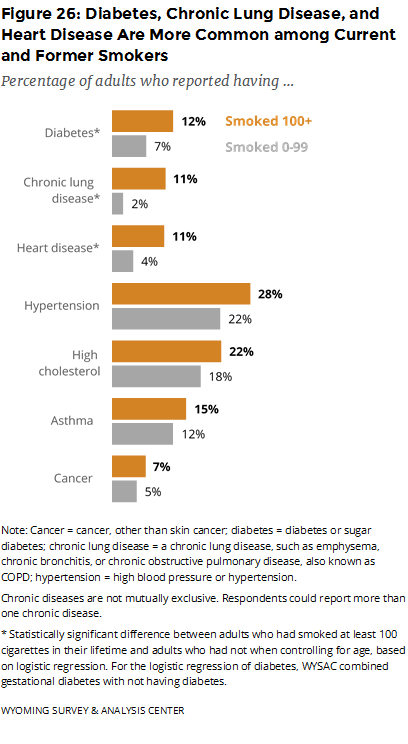Health Consequences of Smoking
 The U.S. Surgeon General has concluded that smoking is harmful to nearly every organ in the body, causes disease, and worsens existing illnesses (USDHHS, 2014). The Wyoming TPCP collects data about the prevalence of several chronic diseases to demonstrate the burden and consequences of tobacco use for Wyoming adults.
The U.S. Surgeon General has concluded that smoking is harmful to nearly every organ in the body, causes disease, and worsens existing illnesses (USDHHS, 2014). The Wyoming TPCP collects data about the prevalence of several chronic diseases to demonstrate the burden and consequences of tobacco use for Wyoming adults.
Adults who had smoked at least 100 cigarettes (current and former smokers) reported worse overall health than those who had not. One fifth (20%) of all adults who had smoked at least 100 cigarettes reported being in fair or poor health, about double the percentage (9%) of nonsmokers.
WYSAC created seven logistic regression models based on data from the 2017 ATS (see Appendix C for detailed, technical results). When controlling for age, the models found that diabetes, chronic lung disease, and heart disease were significantly more common among people who had smoked at least 100 cigarettes (current and former smokers), compared to nonsmokers. The relative risk for diabetes was 1.7 times higher for current and former smokers than experimental smokers and those who never smoked. The relative risk for chronic lung disease was 5.5 times higher for current and former smokers than experimental smokers and those who never smoked. The relative risk for heart disease was 2.8 times higher for current and former smokers than experimental smokers and those who never smoked (Figure 26).
Conclusions
Smokers tend to feel less healthy overall and report more chronic illnesses than nonsmokers. Reducing the prevalence of smoking will, over time, reduce the burden of chronic disease in Wyoming and help Wyomingites feel healthier.

